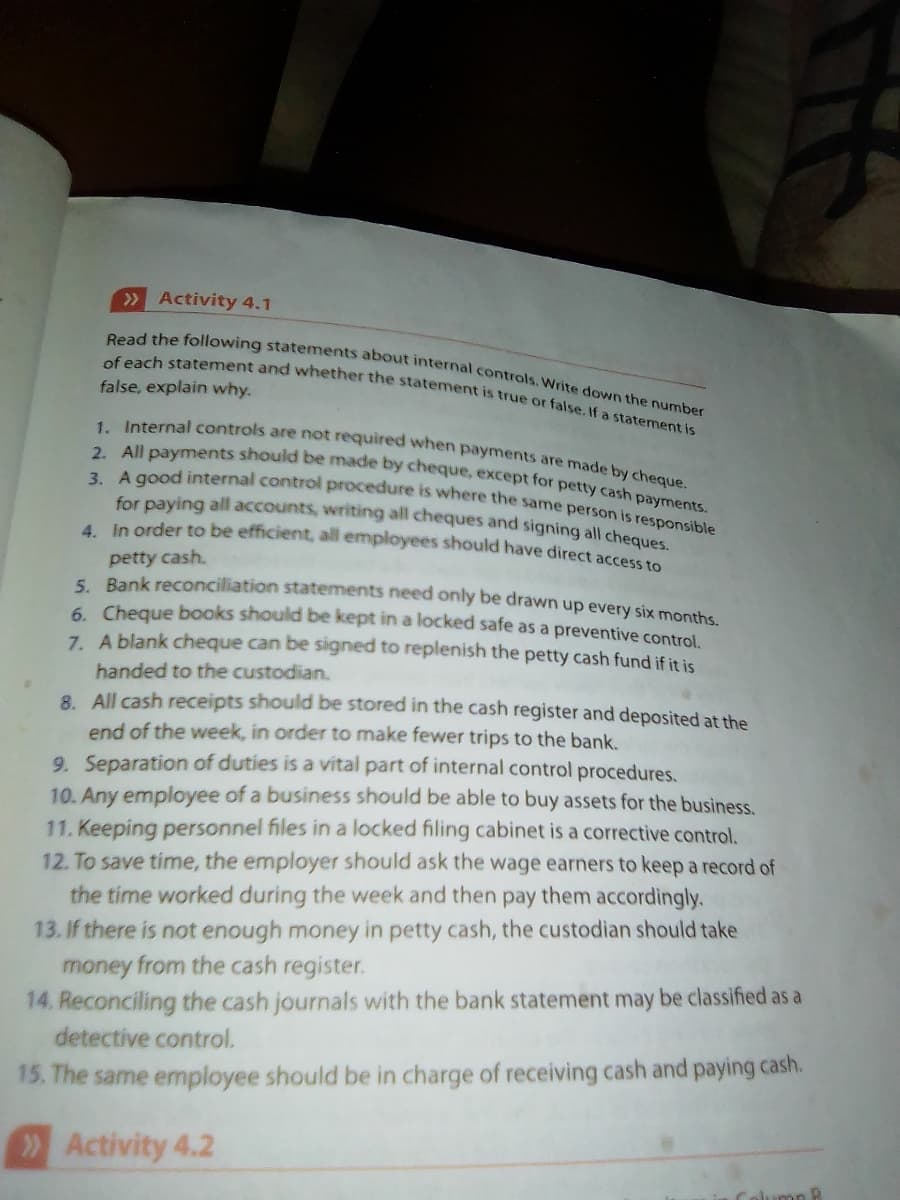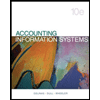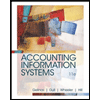Read the following statements about internal controls. Write down the number of each statement and whether the statement is true or false. If a statement is false, explain why. 1. Internal controls are not required when payments are made by cheque. 2. All payments should be made by cheque, except for petty cash payments. nod internal control procedure is where the same person is responsible for paying all accounts, writing all cheques and signing allch In order to be efficient all
Read the following statements about internal controls. Write down the number of each statement and whether the statement is true or false. If a statement is false, explain why. 1. Internal controls are not required when payments are made by cheque. 2. All payments should be made by cheque, except for petty cash payments. nod internal control procedure is where the same person is responsible for paying all accounts, writing all cheques and signing allch In order to be efficient all
Auditing: A Risk Based-Approach (MindTap Course List)
11th Edition
ISBN:9781337619455
Author:Karla M Johnstone, Audrey A. Gramling, Larry E. Rittenberg
Publisher:Karla M Johnstone, Audrey A. Gramling, Larry E. Rittenberg
Chapter10: Auditing Cash, Marketable Securities, And Complex Financial Instruments
Section: Chapter Questions
Problem 12RQSC
Related questions
Question
100%

Transcribed Image Text:3. A good internal control procedure is where the same person is responsible
Read the following statements about internal controls. Write down the number
2. All payments should be made by cheque, except for petty cash payments.
1. Internal controls are not required when payments are made by cheque.
of each statement and whether the statement is true or false. If a statement is
for paying all accounts, writing all cheques and signing all cheques.
» Activity 4.1
false, explain why.
4 ln order to be efficient, all employees should have direct access to
petty cash.
- Pank reconciliation statements need only be drawn up every six months.
6. Cheque books should be kept in a locked safe as a preventive control.
7. A blank cheque can be signed to replenish the petty cash fund if it is
handed to the custodian.
8. All cash receipts should be stored in the cash register and deposited at the
end of the week, in order to make fewer trips to the bank.
9. Separation of duties is a vital part of internal control procedures.
10. Any employee of a business should be able to buy assets for the business.
11. Keeping personnel files in a locked filing cabinet is a corrective control.
12. To save time, the employer should ask the wage earners to keep a record of
the time worked during the week and then pay them accordingly.
13. If there is not enough money in petty cash, the custodian should take
money from the cash register.
14. Reconciling the cash journals with the bank statement may be classified as a
detective control.
15. The same employee should be in charge of receiving cash and paying cash.
Activity 4.2
Column R
Expert Solution
This question has been solved!
Explore an expertly crafted, step-by-step solution for a thorough understanding of key concepts.
Step by step
Solved in 2 steps

Knowledge Booster
Learn more about
Need a deep-dive on the concept behind this application? Look no further. Learn more about this topic, accounting and related others by exploring similar questions and additional content below.Recommended textbooks for you

Auditing: A Risk Based-Approach (MindTap Course L…
Accounting
ISBN:
9781337619455
Author:
Karla M Johnstone, Audrey A. Gramling, Larry E. Rittenberg
Publisher:
Cengage Learning

College Accounting, Chapters 1-27
Accounting
ISBN:
9781337794756
Author:
HEINTZ, James A.
Publisher:
Cengage Learning,

Pkg Acc Infor Systems MS VISIO CD
Finance
ISBN:
9781133935940
Author:
Ulric J. Gelinas
Publisher:
CENGAGE L

Auditing: A Risk Based-Approach (MindTap Course L…
Accounting
ISBN:
9781337619455
Author:
Karla M Johnstone, Audrey A. Gramling, Larry E. Rittenberg
Publisher:
Cengage Learning

College Accounting, Chapters 1-27
Accounting
ISBN:
9781337794756
Author:
HEINTZ, James A.
Publisher:
Cengage Learning,

Pkg Acc Infor Systems MS VISIO CD
Finance
ISBN:
9781133935940
Author:
Ulric J. Gelinas
Publisher:
CENGAGE L

Accounting Information Systems
Finance
ISBN:
9781337552127
Author:
Ulric J. Gelinas, Richard B. Dull, Patrick Wheeler, Mary Callahan Hill
Publisher:
Cengage Learning

Auditing: A Risk Based-Approach to Conducting a Q…
Accounting
ISBN:
9781305080577
Author:
Karla M Johnstone, Audrey A. Gramling, Larry E. Rittenberg
Publisher:
South-Western College Pub

College Accounting (Book Only): A Career Approach
Accounting
ISBN:
9781337280570
Author:
Scott, Cathy J.
Publisher:
South-Western College Pub